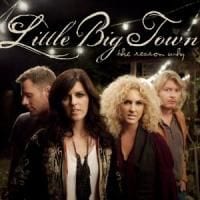
The most omnipresent group in country, maybe even commercial pop, music right now might be the male-female-male vocal trio Lady Antebellum. Waiting in the wings this summer to steal the stage back is the female-male duo Sugarland, formerly a female-male-female trio (they’re battling that departure out in court), with a new album out soon. Touring this year, after getting attention for their 2009 debut album, is the youthful foursome Gloriana, two women and two men who all sing together.
None of these groups was around in 1998, when Karen Fairchild, Jimi Westbrook, Phillip Sweet, and Kimberly Schlapman formed Little Big Town. What they’ve been doing since is similar to those other groups: writing and singing songs meant to show off how well they sing, and how well they sing together. The group hasn’t reached mega-stardom as quickly as Sugarland or Lady Antebellum, though they have had hits, including a collaboration with Sugarland. Their two top 10 country hits were both from their second album, released in 2005.
To say that Little Big Town’s sound is based on the interplay of their four voices would be a serious understatement. It’s what they are about. Towards the beginning of their fourth LP, it almost threatens to overshadow their songs. The first thing you notice on The Reason Why is a soft cloud of voices, in appearance similar to the glow of light that seems to inhabit their hair in the band photo on the ‘70s-tinged album cover.
The vagueness suggested by clouds transfers to how they sing about life and love. Everything has a romantic tone, but, with some exceptions, it isn’t illustrated through specific scenes or stories. The title track, and opening song, sets this up well. Voices float around an ambiguous portrait of love as something you actively let yourself inactively fall into, something you surrender to: “I could love you / If you want me too / I could go on and fall for you and never even try”. That’s a conundrum if I’ve ever heard one. Throughout the album, over storytelling they choose aphorisms (“When you lose something / It’s all that you want back”), mood, metaphors, and expressions of romance that get convoluted enough to resemble philosophical quandaries. In nearly every song, we don’t know who these people are, where they are, or what they do with their days. What do we know? There’s a strong wind blowing, our hearts are running like rivers, and there’s a train outside making so much noise that no one can get it to shut up.
Occasionally they get specific. Often, it involves trains, as on “Runaway Train”, which has an actual story, but one that rushes past us quickly, and “Shut Up Train”, where we at least understand that our lonesome protagonist lives in a house near a train. Still, in that latter song, the specifics mostly represent an idea. It isn’t that the train sound reminds her of someone who left, or that she should be moving on, but that the train sounds exactly like how she feels, and reminds her how she feels: cold, metallic, mechanical. It resonates with her brain and heart, which is where these songs live, more so than in the material world of physical things you can grasp and see. On The Reason Why, specific details almost always stand in for ideas. This is true with “Rain on a Tin Roof”, which has no actual rain on an actual tin roof, and “Life Rolls On”. The first single, “Little White Church”, is the most visceral of the songs, where you can grasp most firmly who is singing what to you. It’s also the bluesiest song, which is not unrelated. The more specific the group gets, the more they set the scene, the crisper and more physical the music itself gets.
For all the general-ness of their songs, the South does emerge strongly as a setting, as a feeling or a style as often as a real place. That happens partly through images of trees, front porches, plantations, and little white churches, but also on a musical level. Across the album they nod toward old traditional music while slathering a Keith Urbanesque romantic sheen across it. “Why, Oh Why” has a chorus (“Why, oh why / Can’t I lay this trouble down”) that, especially when sung by the four without much accompaniment, sounds like something off the chart-topping Oh Brother, Where Art Thou? soundtrack, but the song itself throws in a hefty amount of near-funk arena rock. Filled with gentle clichés, word puzzles, and an occasional glimpse of the natural world, The Reason Why stands at a crossroads between story and metaphor, between surface and depth, between tradition and youth, that at times seems awfully representative of where country music lives today.

![Call for Papers: All Things Reconsidered [MUSIC] May-August 2024](https://www.popmatters.com/wp-content/uploads/2024/04/all-things-reconsidered-call-music-may-2024-720x380.jpg)



